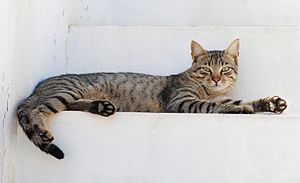A common symptom that cats suffer from is constipation. And while such a condition is fairly common in felines, the symptoms of cat constipation can be anything from painful bowel movements to discomfort to, in more extreme cases, even death. Constipation can stem from a variety of issues and lead to more advanced stages of constipation depending on the severity of the situation. It’s why if your cat is constipated or experiencing abnormal digestive behavior, you should seek immediate consultation with your veterinarian.
Veterinarians help treat conditions such as constipation. They may do so in a variety of ways, including:
- Laxatives: Nothing accelerates the digestive system quite like a laxative. However, many laxatives that are suitable for other animal species, such as saline and stimulant laxatives, are not safe for cats to take. That’s where anti-constipation formulas, designed specifically for felines, come in handy. For instance, Lax-eze is a specialty formula for cats that helps to get things moving in the digestive system.
- Stool softening: Often times cats experience constipation when their feces is either too large or too hard in their digestive system. If that’s the case, the best remedy is to loosen the stool in order for it to more easily pass. This can be done by entering the cats rectum and attempting to loosen the stool with a certain chemical. This is best done by a veterinarian who understands the workings of the cat’s rectum and can safely and effectively complete such a procedure.
- High Fiber Foods: It’s joked that Raisin Bran is a sure-fire way to get the digestive system working in humans. Why? Because it contains a lot of fiber. While we don’t recommend feeding Raisin Bran to your cat, you can attempt to remedy the constipation situation by feeding your animal foods that are high in fiber. Your vet may prescribe a medicine or recommend a food such as canned pumpkin to try to kick the digestive system into gear.
- Prevention: One thing your vet will certainly be sure to do as your cat’s treatment comes to a conclusion is recommend ways to prevent such an issue from occurring again. While genetics plays a role in feline health issues, health issues such as constipation can be solved with a combination of proper diet and a proper dose of vitamins and minerals.
Failure to address conditions such as constipation can have dire consequences on your cat’s behavior and life. Bloody stool, defecation outside of the litter box – potentially on furniture and carpeting – weight loss and pain and discomfort are all common signs of cat constipation. And as we told you in the opening, failure to seek proper treatment can be deadly. That’s why the first sign of constipation should be addressed with a vet.
